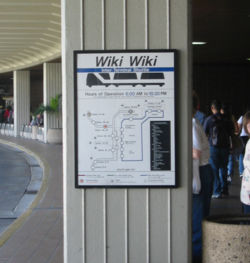Introducing a Wiki
| [▲]Obsolete WikiEducator Rich Text Editor Tutorials (this editor is no longer in use) | ||
|---|---|---|
| Tutorial 1 | Introduction | Advantages and Disadvantages | About WikiEducator | Summary & FAQs | Tutorial 1 | |
| [▲] |
|---|
In this tutorial we will:
|
Contents
[hide]Preknowledge for Learning4Content participants
We encourage Learning4Content participants to review the following resources before embarking on your WikiEducator journey:
|
What is a Wiki?
The name "Wiki" was chosen by Ward Cunningham -- the creator of the first Wiki. It is a shortened form of "wiki-wiki", the Hawaiian word for quick.A wiki is a web site that is generally editable by anyone with a computer, a web browser, and an Internet connection. Wikis use a quick and easy syntax to allow users to apply formatting to text and create links between pages. This simple formatting syntax means that authors no longer need to learn the complexities of HTML to create content on the web.
The main strength of a wiki is that it gives people the ability to work collaboratively on the same document. The only software you need is an Internet browser. Consequently, wikis are used for a variety of purposes. If you make a mistake, it's easy to revert back to an earlier version of the document.
Examples of Wikis
The largest and most talked about Wiki on the Internet is Wikipedia[4]Wikipedia is, for the most part, editable by anyone in the world with a computer and an Internet connection and, as of 2009, contained over 14,000,000 articles in more than 260 languages. Since its creation in 2001, Wikipedia has grown rapidly into one of the largest reference web sites, attracting around 65 million visitors monthly as of 2009. There are more than 85,000 active contributors working on Wikipedia articles! While Wikipedia's mission is to create an encyclopedic resource of knowledge, wikis can be used for a variety of purposes and are quickly becoming the defacto technology for collaborative group work online. They can be great social tools for classrooms, teams, and community groups, or configured to provide easily updatable web sites for organisations.
The following wikis display a range of different applications of wiki technology:
- WikiWikiWeb[5] - the first ever wiki, it has been around since 1995.
- Wikitravel[6] - a project to create a free, complete, up-to-date, and reliable world-wide travel guide.
- Moodle docs - a community wiki used to develop and maintain the documentation for Moodle, the popular open source learning management system.
- Scholarpedia[7] - a wiki project based on a system of peer review.
There are literally thousands of wikis around the web on a diverse range of subjects and supporting many communities.
| The purpose of this activity is to introduce you to a few examples of wiki projects. In this activity you are encouraged to visit at least three of Wikipedia's sister projects listed below.
For each of the Wikimedia project sites, you should:
Visit three sites from the list of Wikimedia projects below:
|
Many of Wikipedia's sister projects were initiated because the encyclopedia was being cluttered by entries that were not appropriate for an encyclopedia.
Interesting uses of Wiki technology
- British Council Case Study on using wiki technology to promote collaboration at the office.
- Conference planning, see for example Wikimania 2006
- Wiki as an online presentation tool demonstrated by Meredith Gorran Farkas, a distance education librarian.
- Open Streetmap is a wiki project to provide free geographic data such as street maps to anyone who wants them.
- Distinguishing between types of wiki communities - the difference between "above-the-flow" and "in-the-flow" wikis.
- The Wealth of Networks WikiNotes - This Wiki is an invitation to collaborate on building a learning and research environment based on Yochai Benkler's book, The Wealth of Networks: How Social Production Transforms Markets and Freedom, available under a Creative Commons Attribution Noncommercial Sharealike license.
- Other uses include:
- Meetings (Posting of agendas, prior meeting discussions, minutes)
- Documentation for collaborative projects
- Web space for personal note taking
- If you find a really interesting use of a wiki - please feel free to add it to the list above.
References
- Jump up ↑ http://wikieducator.org/Archbiship_Emeritus_Desmond_Tutu_on_the_importance_of_freedom
- Jump up ↑ http://wikieducator.org/OER_Handbook/educator_version_one/Introduction
- Jump up ↑ http://www.capetowndeclaration.org
- Jump up ↑ http://en.wikipedia.org
- Jump up ↑ http://c2.com/cgi/wiki?WelcomeVisitors WikiWikiWeb
- Jump up ↑ http://wikitravel.org/en/Main_Page Wikitravel
- Jump up ↑ http://www.scholarpedia.org/article/Main_Page Scholarpedia
- Jump up ↑ http://en.wikinews.org/wiki/Main_Page Wikinews
- Jump up ↑ http://commons.wikimedia.org/wiki/Main_Page Wikimedia Commons
- Jump up ↑ http://en.wikiversity.org/wiki/Wikiversity:Main_Page Wikiversity
- Jump up ↑ http://en.wikiquote.org/wiki/Main_Page Wikiquote
- Jump up ↑ http://en.wiktionary.org/wiki/Main_Page Wiktionary
- Jump up ↑ http://en.wikibooks.org/wiki/Main_Page Wikibooks

